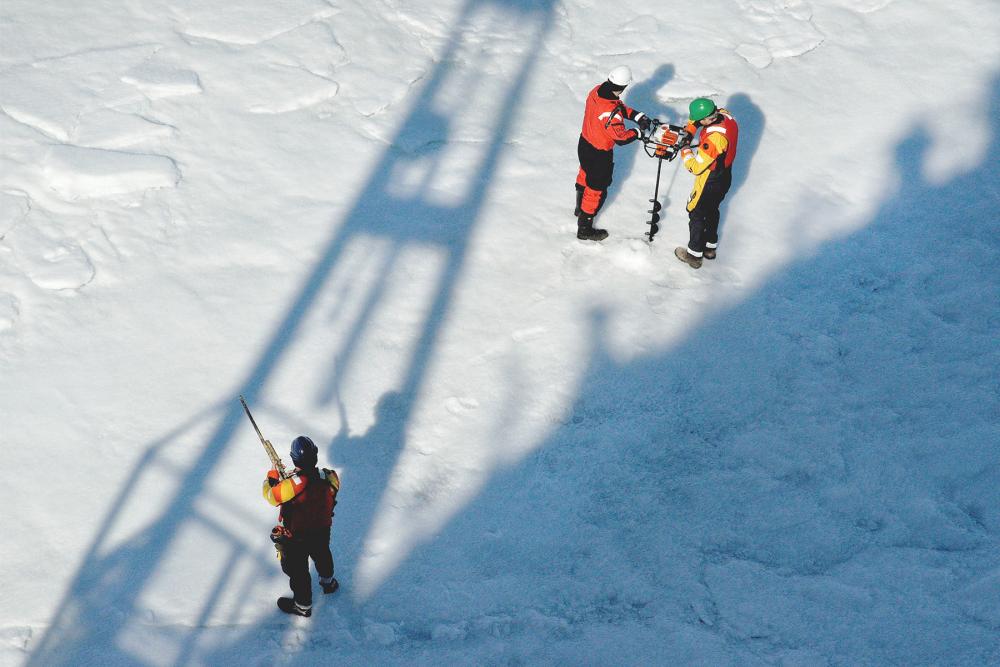
Collaboration in Science: An Essential Element to Increase Scientific Knowledge
For 30 years, the teams at the Maurice Lamontagne Institute have been working with other science teams here and around the world to share knowledge and to take advantage of what is done elsewhere. These exchanges improve our research and monitoring programs, and give us an accurate idea of trends in the environment and in biodiversity around the world.
Dynamic networks
Many of our researchers are members of networks such as Québec Océan, a group of oceanography scientists; Ressources Aquatiques Québec, a group of researchers for the sustainable development of the aquacultural and fisheries industry in Quebec; and the Quebec Maritime Network, which leads innovation and research in the various maritime sectors. Researchers also participate in the Intergovernmental Panel on Climate Change, the North Atlantic Right Whale Consortium in New England, and in the Canadian Healthy Oceans Network (CHONe). The cooperative research projects of these networks create a solid scientific base in support of Canada's marine conservation efforts.
The vast majority of our researchers are also associate professors at universities such as Université du Québec à Rimouski, Université Laval and McGill University, and supervise students pursuing graduate studies in science. Many research projects are also conducted jointly with academic centres. That is the case with the Institut des sciences de la mer de Rimouski and organizations such as the Group for Research and Education on Marine Mammals or the Mingan Island Cetacean Study.
International partnerships
At the international level, the research that our teams conduct contributes to
- the identification and protection of vulnerable marine ecosystems, communities, species and habitats;
- a better understanding of the variability of oceans and the effects of climate change;
- the sustainable management of fish stocks that straddle boundaries and of highly migratory fish stocks in the Atlantic Ocean;
- the practice of sustainable fisheries and harvesting strategies that incorporate the precautionary approach.
To fulfill their mandate, our scientists have developed close ties with the Institut français de recherche pour l’exploitation de la mer, which contributes to knowledge about the oceans and their resources, the monitoring of the marine environment and the coastline, and to the sustainable development of marine activities. They have also collaborated with the National Oceanic and Atmospheric Administration, a U.S. agency that focuses mainly on climate change and knowledge sharing to protect marine ecosystems and resources, and that ensures sustainable fisheries management. To ensure the safety of marine transportation, our team from the Canadian Hydrographic Service also collaborates with international experts to remain at the cutting edge of navigational services and information.
All of these collaborations provide access to complementary expertise and to a broader selection of operation platforms, equipment and data. Thus, we mobilize resources, benefit from an improved scientific methodology, and we perfect the transfer of knowledge and technological developments.
Charting the course
The data collected to monitor our oceans are shared with other countries and are part of the products and services provided for meteorology, emergency management and marine safety. Our scientists support the Argo drifting float program, which provides an overview of the oceans' role in climate. They also conduct research aimed at understanding climate change and adapting to it. They have influenced the Intergovernmental Panel on Climate Change, and they continue to contribute to this group's work. Our teams also play an essential role as members of international scientific organizations, including the International Council for the Exploration of the Sea, and within large-scale monitoring and data management projects carried out by UNESCO's Intergovernmental Oceanographic Commission. In addition, the Canadian Hydrographic Service is a member of the International Hydrographic Organization. Bilateral scientific activities with the United States and Denmark have also been undertaken in support of Canada's sovereignty under the United Nations Convention on the Law of the Sea.
Our scientists develop Independent and public science advisories on fisheries and environmental issues to guide decisions concerning fisheries and the protection of the aquatic environment. These advisories are posted on the Department's website, while many other data are also disseminated on the St. Lawrence Global Observatory (SLGO) portal.
Guy Cantin
Science

© Laetitia
Research activities in the Arctic, in the shadow of the Amundsen

DFO L. Lefrançois





